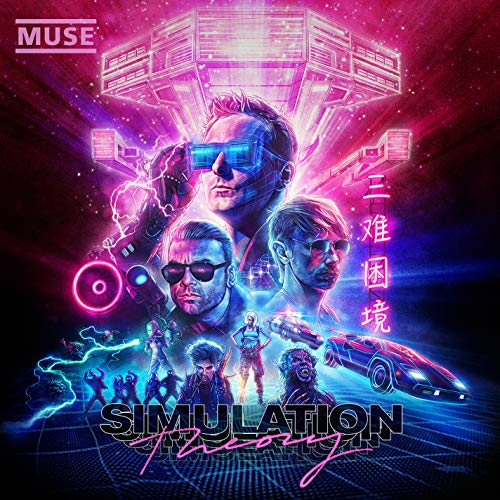
Muse
Simulation Theory
Release Date: Nov 9, 2018
Genre(s): Pop/Rock
Record label: Warner Bros.
Music Critic Score
How the Music Critic Score works
Buy Simulation Theory from Amazon
Album Review: Simulation Theory by Muse
Satisfactory, Based on 10 Critics
Based on rating 8/10
Whether they're fighting alien invaders, shadowy government conspiracies, or the Apocalypse, Muse always do it for love. On their eighth effort, Simulation Theory, they attempt to break through the virtual matrix in search of that human connection and freedom from the machine. The least complicated or overly conceptual offering (for Muse) in over a decade, the 11-song set is focused and cohesive, blaring down a neon-washed highway of pulsing synths and driving beats while swerving to avoid the orchestral and dubstep meandering of their preceding 2010s output.
Based on rating 4/5
With space-age rockabilly and EDM machine gun beats, this bizarre new album sees Muse retreat from the real world and into a 'Tron'-style pastiche of their own adolescence. You'll be ashamed to tell anyone how much you love it In a bid to escape boredom in the early '90s, three awkward teens from Teignmouth, Devon, wearing Ned's Atomic Dustbin and Nirvana t-shirts, channelled their adolescent angst - and the drive to be as weird as possible - to form what would become the institution and stadium powerhouse that is Muse. In those early interim days of artsy grunge experimenting, they went by the names Carnage Mayhem, Gothic Plague and Rocket Baby Dolls.
Based on rating 6.0/10
Coming to theaters in November, the most diabolical plot yet for world domination from a familiar trio of cybernetic mercenaries. After acquiring Netflix, HBO Go, and Amazon Prime accounts, they achieve technological singularity halfway through a "Stranger Things" binge, having consumed enough popular media to pass now as humans. If that sounds like the typical plot of any Muse album, it essentially becomes their autobiography on their eighth, Simulation Theory.
Based on rating 6/10
The age-old question 'are Muse taking the piss?' is surely at least partially affirmed by the cover art to eighth album Simulation Theory. A sort of knowingly preposterous Eighties movie poster homage featuring very silly renderings of the Devonian trio in rad shades, it would be a conspiracy theory too far to suggest it was meant to be serious, and strongly suggests that just maybe some of Matt Bellamy's more outré pronouncements about aliens and whatnot were simply him having a laugh. Muse's record sales follow a fairly familiar pattern for the contemporary arena rock act: their late Noughties albums sold millions; their most recent two (2nd Law and Drones) enjoyed high chart positions (Drones was their first US number one) but sold comparatively few actual units.
Based on rating 3/5
Ah, Muse in 2018. Where to begin? The days of 'Origin Of Symmetry', 'Absolution' and the Devon trio making some of the most engaging, interesting rock in the world seem but a speck in the rear-view mirror, as Matt Bellamy and co have threatened to become a parody of themselves over the last decade. On 2015's 'Drones' they became obsessed with… drones.
Based on rating C
The Lowdown: Muse have long dabbled with infusing electronica into the sonic staples of rock, and Simulation Theory, their eighth record, sees the trio lean into that sound more boldly than ever. However, this delicate rock-electronic elixir is executed far more successfully on some tracks than others. Whereas certain songs allow the bevy of nuance that Simulation Theory presents to achieve a natural state of cohabitation, others bombard the ear with excess — forcing the musical duality with a heavy hand rather than letting it naturally manifest.
Based on rating 2.5/5
This is Muse in 2018 - take them or leave them. I'm still convinced that Muse's decision to soundtrack the Twilight saga is what singularly led to their downfall. That's obviously a baseless accusation on its face, so allow me to explain. The first movie in the series debuted in 2008 - right after the release of Black Holes and Revelations, but before its futile successor, The Resistance.
Based on rating 4/10
GENERATING CONTENT. . .
Based on rating 2
Muse‘s eighth album is their first since the conclusion of their trilogy of ever more ridiculous concept albums – The Resistance, The 2nd Law and Drones – and it seems the perfect time for the band to tilt off on a new direction. For, in retrospect, The Resistance was where it all started going a bit wrong for Muse. It marked the point where things stopped being impressively ambitious, and just started to become a tad ludicrous.
Opinion: Fairly Good
A meme circulates among over-privileged western male nerds: that we might all be living in a simulation. Muse's eighth album title tilts at the notion; tracks called Thought Contagion and Algorithm, meanwhile, reinforce the impression that the Devonian trio continue to play the canaries in our impending apocalypse. Muse, though, are great at simulations.
'Simulation Theory'
is available now

